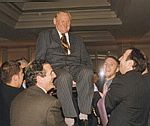Latvian elites are slowly coming to terms with their nation's role in the Holocaust. Opening the International Historians' Conference on probing the Holocaust in the Baltics last week in Rīga, President Vaira Vīķe-Freiberga made what news agencies referred to as "a rare public admission" when she called the participation of Latvians in this WWII tragedy "our eternal sorrow and our eternal shame."
At the same time, Latvian prosecutors have finally found a way to bring criminal charges against an accused Nazi war criminal. Reactions to a recent anti-Semitic article in a prominent magazine have been swift and led to the dismissal of irresponsible journalists. The Ministry of Education is integrating Holocaust history into school curricula.
These changes, however, are not the result of any "tectonic shifts" in Latvians' traditional self-perception as victims of Nazi and Soviet occupations (rather than partial collaborators with both regimes). Instead, the strong wording, admitting and condemning Latvians' role in the Holocaust, and the progress of investigations into Nazi war crimes reflect the gradual success of the most pro-Western elements in Latvia's political and bureaucratic spectrum. The representatives of these pro-Western tendencies have succeeded in convincing their colleagues of the necessity of joining the "community of shared values," which would, in turn, clear the way for membership in the institutions of this community.
Duty and resentment
Coming to terms with the past is perceived by many in Latvia as a duty to be paid for entering Western institutions—and is also resented as such. Anonymous discussions on the Internet are full of messages from people outraged by such "interference into Latvian affairs" on the part of Western political patrons and Nazi-hunting organizations. Nationalist politicians call the awaited Nazi war crimes trial a "circus" used by "every Jewish organization for its own benefit."
Some editors were personally offended when journalists tried to publish an American Jewish Committee statement on the need to further pursue the prosecution of the alleged criminals in the Latvian press. "How can you be dealing with them? Have you read what they say about Latvia?" cried the editors.
Nevertheless, although Latvians are reluctant to see themselves as anything other than victims, there has been no significant backlash. Researchers have not found anti-Semitism to be a serious problem in Latvia, and organized anti-Semitic extremism is practically non-existent.
But some realities cannot be ignored, as Latvia's leading historian of Judaic studies, Aivars Stranga, admitted at last week's conference. For instance, it was unfortunate, he said, that in response to the now notorious article "Jews Rule the World," published in Kapitāls magazine, the popular Internet portal Delfi featured about 900 openly anti-Semitic comments.
It is easy to see why most Latvian politicians are uncomfortable addressing issues concerning anti-Semitism and the Holocaust at home, preferring to sidestep them in public. Professor Stranga, however, believes that avoidance will not do the trick and that educating the community is the strongest weapon against anti-Semitism. The good news is that he is not alone.
The educators
The 200, mostly Latvian, education officials, teachers and historians who gathered last week in Rīga had precisely that in mind—promoting Holocaust research and education and raising public awareness of the Shoah in a country where 80,000 Jews (more than 90 percent of the pre-war Jewish population) were killed.
At the event, organized by the government-sponsored Historians' Commission, the History Institute and the Center for Judaic Studies, historians had much to complain about. A lack of funds is still the most significant obstacle, preventing some of the best young researchers from getting involved in Holocaust studies. Another related key problem is gathering evidence in small cities, where crucial bits of information could be obtained, but where it is most difficult to find witnesses.
The conference did not consist only of complaints, though. Enthusiasts of the "new historical thinking" in Latvia had their share of successes to talk proudly of: the inclusion, since 1997, of the Holocaust in the regular history curriculum for secondary schools, new textbooks, translation of the works of Nobel laureate Elie Wiesel and the establishment of the Center for Judaic Studies at the Latvian University.
The punishment
For a long time, any positive changes have been overshadowed by the indecisive actions in the investigation of war crimes committed by Latvians. Only two of the alleged Latvian participants in Nazi atrocities remain alive; both live in Australia. It took several years and some dramatic changes in the leadership of the Prosecutor-General's Office before criminal charges were finally filed against one of them—Konrāds Kalējs.
Prosecutors, who charged the 87-year-old Kalējs with genocide last month for his role as a guard at a Nazi concentration camp near Rīga, had to apply a completely new interpretation of Latvian law. Although Jewish groups claim that Kalējs was an officer in the Arājs Commando, a Nazi death squad responsible for murdering some 30,000 Jews, there is no direct evidence of his personal participation in executions. He is charged, instead, with "enabling the concentration camp's administration to create living conditions for Jewish inmates bound to drive them into complete or partial destruction."
President Vīķe-Freiberga, who has on a number of occasions been openly critical of prosecutors' performance, alluded to Kalējs's case at the Holocaust conference: "We must now set about... pursuing those who are still alive and have not yet received punishment for crimes committed so many years ago," she said.
A district court refused last month to grant an arrest warrant for Kalējs, which would enable an extradition request to be filed with Australia, prompting an appeal that resulted in a regional court order for reconsideration of that decision. What's more, the Latvian-Australian extradition treaty itself remains to be ratified in the Latvian parliament, with some nationalist politicians hinting that there is no real rush to vote on it.
One thing is clear: it will take a great deal of good will and modern legal thinking to complete the process against Kalējs.
The hero
 |
| Latvia's righteous Gentile: Bruno Rozentāls |
Symbolically, just as the Prosecutor-General's Office was putting together the final bits of the Kalējs puzzle, across the ocean a very different man was being honored at the bar mitzvah of a boy with family roots in Latvia.
Latvia could use more people like Bruno Rozentāls, a strongly religious Lutheran peasant, who spent only six years in school and saved 36 Jews from death in Nazi camps. "Go and represent Latvia," the President told Rozentāls before his trip to the United States, and indeed he did. During the short week he spent in Washington, hundreds of children in seven schools came to say thank you and shake the hand of the Latvian righteous Gentile. Children from the Adas Izrael Congregation invited him to come again in the spring, when they will plant "Rozentāls's tree" in their garden.
How many schools has Rozentāls ever visited in Latvia? None. The first Latvian school in which he talked about his experience was that of Washington's Latvian community.
It is ironic that the person who for three years as a teenager had the nerve to keep smuggling Jews out of the concentration camp, took them on a 70-kilometer bicycle trip, waving with a smile to the German guards at checkpoints, hid the rescued in a bunker under his floor and took care of them for long months without letting the neighbours know, was nervous before talking to a bunch of kids. "What will I tell them?" he kept saying. "It's different," he insisted, when someone suggested he tell them the same things he told others.
It is not surprising that when trying to obtain permission to travel to Israel at Golda Meir's invitation in the 1960s, Rozentāls received a refusal and sarcastic remarks from Soviet officials, who said there had been no use in his saving the Jews. "They didn't join the Red partisans, did they?" he was told.
But it is sad that for years, the man whose name is engraved at the Yad Vashem memorial as "the righteous among nations" had felt that his heroic effort to save the lives of fellow human

|
"It has been almost 60 years, and during the Soviet time, we were not allowed to discuss such matters," explained Rozentāls to students at the Adas Izrael Congregation, who wondered whether people in Latvia today know what happened to Jews in their country during the Second World War. "For young people it is difficult to even imagine that such things could have happened, but it is important that they know," he added.
"People in the United States have only recently started to admit things that happened to the Native American population in the last century. And Latvia has regained its independence only a decade ago," said Joel Swerdlow, an editor at National Geographic and Rozentāls's host, after his appearance.
On a more optimistic note, Bruno Rozentāls returned relieved from his first trip to the Latvian school. "It went much better than I expected," he smiled, and promised to visit any schools back home he might be invited to.
The free
Children at the synagogue in the US called him their hero. In the past couple of years, Latvians have increasingly started to recognize the handful of "righteous Gentiles" from Latvia as their heroes and moral authorities, too. This could prove more useful and instructive than any textbook.
At the end of her widely cited speech at the conference, Vaira Vīķe-Freiberga used the biblical line "the truth shall set you free" to call for sorting out "the truth from untruth, fact from fiction, interpretation from documentation and emotion from reason." "We must understand our past, so that this understanding frees us," the President said.
When Latvian children at Bruno Rozentāls's church start coming up to him with the same admiring eyes as their Jewish peers overseas, they will no longer be victims. They will truly be a free nation.
Daria Kulagina, 19 October 2000
Moving on:
- Archive of Latvian news reviews
- Archive of articles on Latviain CER
- Browse through the CER eBookstore for electronic books
- Buy English-language books on the Baltic states through CER
- Return to CER front page



